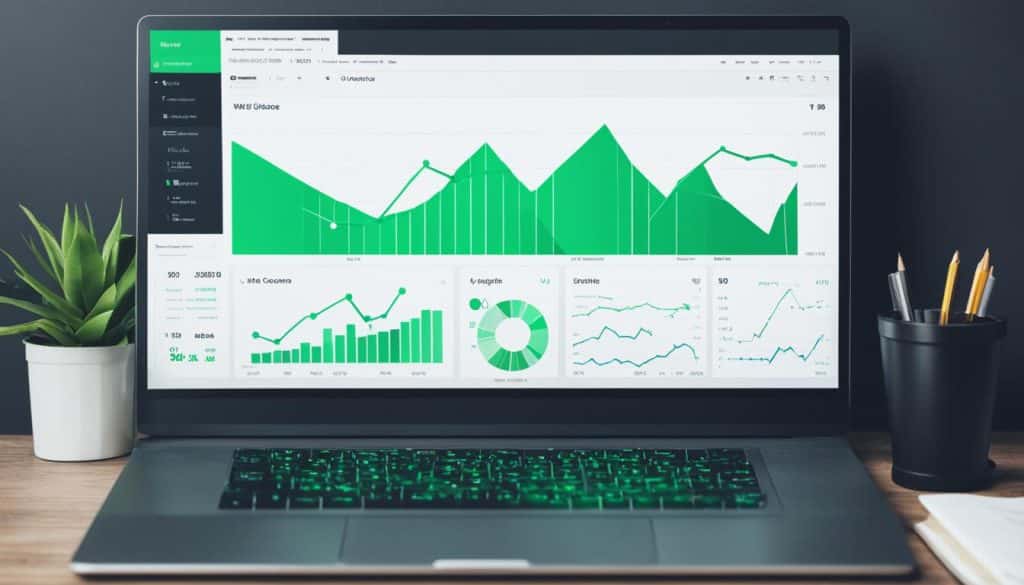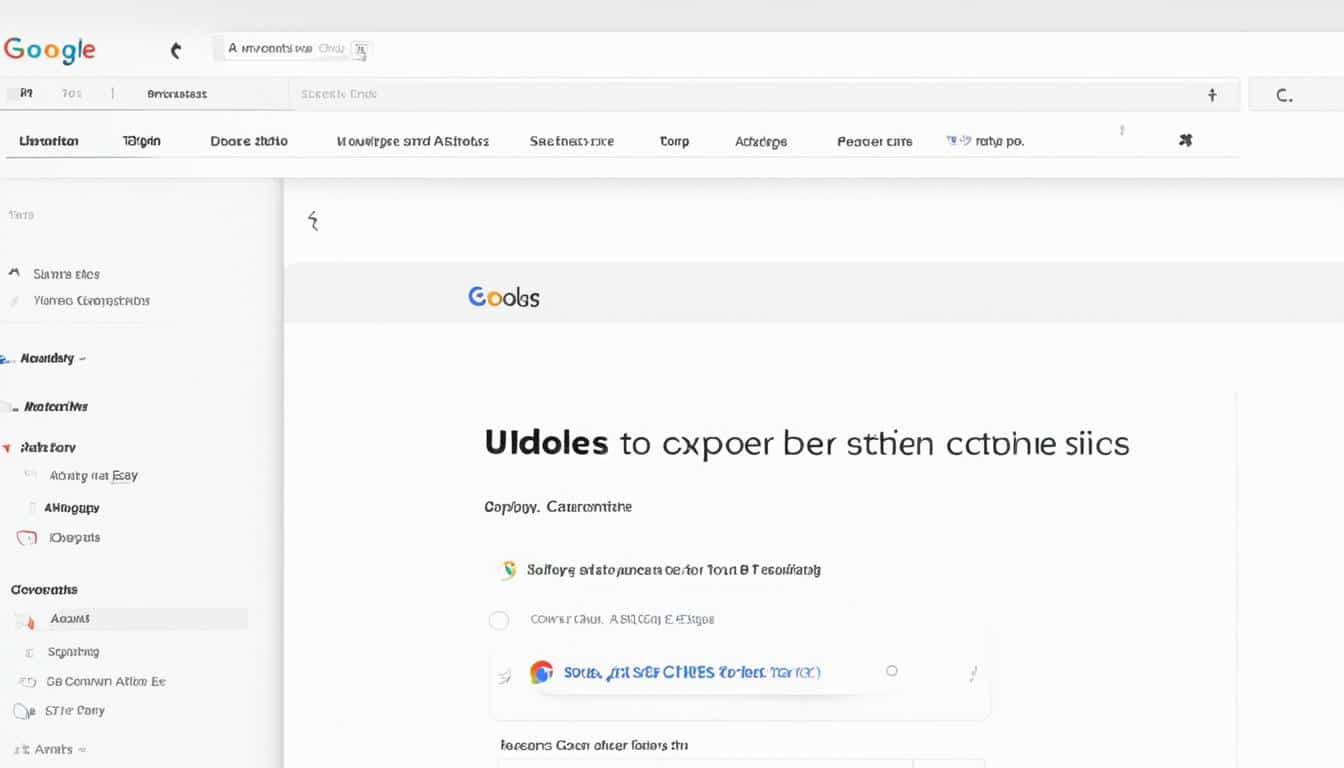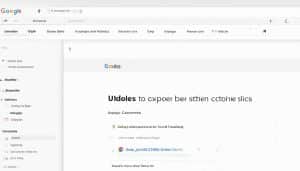Search Engine Optimization (SEO) is key to making your website more visible. It helps drive more organic traffic. By using effective SEO techniques, your site can rank higher in search results. This attracts more visitors and boosts your online presence.
Understanding SEO strategies and techniques is vital. You need to optimize your website structure, create quality content, and do thorough keyword research. Also, use on-page optimization techniques. These steps can improve your search engine rankings and draw in organic traffic from the Google search engine.
Working with an SEO specialist can be very helpful. They offer expert advice and strategies for your site. An SEO specialist does deep keyword research, looks at competitors, and uses the latest industry trends.
Key Takeaways:
- Effective SEO strategies can make your site more visible and increase organic traffic.
- Optimizing your website structure, creating quality content, and doing thorough keyword research are key for SEO success.
- Working with an SEO specialist can give you expert advice and tailored strategies for your website.
- Regularly checking and analyzing your SEO performance is important for making informed decisions and improving your rankings.
The Importance of Quality Content in SEO
Quality content is essential for search engine optimization (SEO). To boost your search engine rankings, you need to publish content that is authoritative and relevant. This content should resonate with your target audience.
Creating quality content involves authoritative writing. Well-researched articles, blog posts, and website copy build trust with your audience. It shows your expertise in your field. This improves your site’s authority and relevance, encouraging other sites to link to you.
“Publishing authoritative and relevant content is the cornerstone of successful SEO. By providing valuable information and becoming a trusted source in your industry, you can attract more visitors to your site and improve your search engine rankings.”
Keyword research is also vital for quality content. Analyzing the search terms your audience uses helps you optimize your content. By using these keywords in your headlines, subheadings, and text, you can increase your site’s visibility in search results.
It’s also important to link to relevant sources in your content. External links to authoritative websites show search engines that your site offers valuable information. This can boost your rankings and drive more traffic to your site.
Increased Site Traffic and Improved Authority and Relevance
Creating authoritative content can greatly benefit your website. It attracts more visitors, giving you a chance to turn them into customers or subscribers. If your content is engaging and meets your audience’s needs, it can encourage them to take action on your site.
Being seen as an expert in your field through your content boosts your site’s authority and relevance. Search engines want to show users the best and most trustworthy results. By consistently posting high-quality content, you show search engines your site is valuable. This can lead to improved search engine rankings, more visibility, and more organic traffic.
In conclusion, quality content is key for good SEO. By publishing authoritative and relevant content, using smart keyword research, and linking to relevant sources, you can boost your site’s traffic. This improves your authority and relevance, leading to better search engine rankings.
Optimizing Your Website Structure for SEO
Your website’s structure is vital for its search engine optimization (SEO) success. By optimizing your website structure, you can make it more visible in search engine rankings. This also improves the user experience. Let’s look at important website structure elements that can help your SEO.
URL Optimization
The URLs of your webpages should be concise, relevant, and include targeted keywords. Optimize your URLs to provide search engines and users with a clear understanding of your webpage’s content.
“A well-optimized URL provides valuable information about the page’s content.”
| Bad URL Example | Good URL Example |
|---|---|
| example.com/page1/123456 | example.com/seo-tips |
Page Titles
Each webpage should have a unique and descriptive page title. Incorporate relevant keywords into your page titles to improve search engine ranking and attract the attention of users.
“Page titles play a crucial role in attracting users and search engine attention.”
Headings and Subheadings
Utilize headings (H1, H2, H3, etc.) and subheadings to organize your content and provide a hierarchical structure. Incorporate important keywords into your headings and subheadings to signal their significance to search engines and improve your SEO performance.
Organizing Content for User-Friendly Experience
Organize your content in a logical and easy-to-navigate manner. A well-structured website makes it easier for search engines to crawl and index your site effectively.
“A user-friendly website structure enhances the experience of your visitors and encourages them to explore further.”

Optimizing your website structure is key. This includes URL optimization, page titles, headings, and subheadings. It helps your site show up better in search results and makes it easier for users to navigate.
Remember these tips when you’re working on your website’s SEO. They help drive more organic traffic and reach your audience.
The Importance of Regularly Updating Your Content
Keeping your content fresh is vital for maintaining relevance and boosting your SEO. Old content can hurt your site’s performance. So, it’s important to update your content regularly.
By keeping your content current, you show search engines your site is valuable. This can lead to better rankings, more visitors, and higher visibility.
Updating your content also lets you add new insights and trends. This makes your content more relevant and useful to your audience. It shows you’re up-to-date in your field and provide the best information to your visitors.
Also, content updates are a chance to use new keywords. By finding the right keywords, you can make your content more appealing to search engines. This can help you rank higher in search results.
Regularly updating your content shows search engines your site is valuable. This leads to better rankings and more visitors.
When you update your content, consider these tips:
- Identify outdated content: Check your website for old or irrelevant pages. This could include outdated stats or old trends.
- Refresh and revise: Update old content with new information. Make sure it’s accurate and relevant. You might need to add new examples or expand on topics.
- Optimize for keywords: Use keyword research to find important keywords. Then, naturally add them to your text.
- Add new media: Use images, videos, or infographics to enhance your content. Visuals can engage your audience and make your content more shareable.
Regular updates benefit your SEO and user experience. Visitors like websites that offer fresh, informative content.
By focusing on content updates and maintaining relevance, your website stays competitive. It will continue to attract organic traffic.
The Impact of Content Updates on Search Engine Rankings
Updating your content can greatly improve your search engine rankings. Search engines value fresh, relevant content. Regular updates show them your site is valuable to users.
Search engines look at factors like relevancy, authority, and user experience. By updating your content, you address these factors. This can make your site more visible in search results.
Here’s how content updates can boost your rankings:
- Improved keyword targeting: Updates let you add new keywords. Targeting these keywords can help you rank higher for specific searches.
- Increased user engagement: Updated content attracts more user engagement. This includes longer visits, lower bounce rates, and more shares. These signs show search engines your content is valuable.
- Enhanced search engine visibility: Regular updates mean search engines crawl and index your pages more often. This can improve your visibility in search results, bringing more visitors.
Regularly updating your content is key for maintaining relevance, improving rankings, and attracting visitors. By staying current, delivering valuable info, and optimizing for keywords, you can enhance your site’s performance. This establishes your authority online.

Leveraging Metadata for SEO
Metadata is key in SEO. It helps search engines understand and rank your site. By using metadata well, you can get more visitors and better rankings.
The Importance of Title Metadata
Title metadata shows up as the page title in search results. It’s the first thing people see. Search engines also look at it when ranking your pages.
Creating catchy and keyword-rich page titles is vital for SEO. Using the right keywords in your title metadata can help your site show up higher in search results. A good title not only helps search engines but also encourages people to click on your site.
Maximizing Description Metadata
Description metadata, or meta description, is a short summary of your page. It doesn’t directly affect rankings but can draw more visitors. A well-written meta description can make your site more visible and attractive.
Write a meta description that accurately sums up your page and grabs attention. Including relevant keywords can also help search engines understand your page’s context.
Harnessing the Power of Keyword Metadata
Keyword metadata, or meta keywords, involves adding relevant keywords to your page’s metadata. Even though Google doesn’t use it for rankings, it’s useful for other search engines or site searches.
Choose keywords that match your page’s content when using keyword metadata. Don’t stuff your metadata with too many keywords. This can harm your site’s performance.
Optimizing Alt Tags for Improved Accessibility
Alt tags provide text descriptions for images and media. They help users with visual impairments and search engines understand your visual content.
Write alt tags that are descriptive and concise. Use relevant keywords. This boosts your site’s visibility and improves user experience.

| Metadata Type | Description | Benefits |
|---|---|---|
| Title Metadata | Appears as page title in search results | Improves search engine rankings and click-through rates |
| Description Metadata | Concise summary of webpage content | Enhances site visibility and attracts more organic traffic |
| Keyword Metadata | Relevant keywords in page metadata | Useful for other search engines or internal site searches |
| Alt Tags | Alternative text descriptions for images | Improves accessibility and enhances search engine indexing |
The Importance of Link Building in SEO
Link building is a key part of SEO. It helps improve your search rankings and makes your site more visible. Getting authoritative backlinks from relevant sources makes your site a trusted source of info.
Linking to other sites in your industry can make your content more valuable. Internal linking helps connect your site’s pages better. This makes your site easier to navigate.
“Link building is like building a network of connections that vouch for the quality and relevance of your content.”
The Power of Authoritative Backlinks
Authoritative backlinks are links from top sites that search engines trust. These links show that your content is valuable and relevant. They help search engines see your site as credible.
When big sites link to yours, search engines think your site is trustworthy. This can boost your rankings. So, getting authoritative backlinks is key to a good link building strategy.
Internal Linking for Enhanced SEO
Internal linking connects your site’s pages. It helps users find more relevant content. This makes your site more useful and keeps visitors longer.
It also helps search engines understand your site’s structure. This makes it easier for them to index your pages. This can help your site show up more in search results.
Linking to Relevant Sources and Providing Value
When you create content, link to credible sources that support your points. This makes your content more credible and valuable to readers.
Linking to reliable sources shows search engines your content is well-researched. It can improve your rankings. Plus, it gives readers more chances to learn and explore.
The SEO Benefits of Link Building: Infographic
To illustrate the importance of link building in SEO, here is an infographic that highlights the key benefits:

Link building is key in SEO. It helps your site get more visible and trusted online. By getting good backlinks and linking to your own content, you boost your site’s ranking.
Mobile Optimization and Technical SEO
More people use mobile devices now. So, making your site mobile-friendly is a must. It ensures a smooth experience for users, keeping them on your site longer.
The Importance of Mobile Optimization
Mobile optimization makes your site work well on phones and tablets. It means your site looks good on any screen size. This makes users happy and more likely to stay and buy.
Technical SEO Best Practices for Mobile
Technical SEO makes your site run smoothly and helps it show up in searches. For mobile, focus on these:
- Fast Loading: Make your site quick to load. Use image compression and caching to speed it up.
- Clean URL Structure: Use easy-to-read URLs. They help both search engines and users understand your site better.
- Schema Markup: Add schema markup to give search engines more info about your content. It can make your site stand out in search results.
By focusing on mobile optimization and technical SEO best practices, you improve your site’s mobile performance. This boosts your site’s visibility and user experience.
Mobile optimization and technical SEO show you care about your users. They help your site load fast, have clear URLs, and use schema markup. This attracts more mobile visitors and boosts your SEO.
Monitoring and Analyzing Your SEO Performance
After optimizing your site, keep an eye on how it’s doing. Track important metrics to see if your efforts are working. This helps you make your site even better for search engines.
“Monitoring SEO performance is like having a compass for your digital marketing strategy. It guides you in the right direction by helping you identify what’s working and what needs improvement.”
Watch your keyword rankings to see how your site is doing in searches. Use tools like Google Analytics, SEMrush, or Moz to track your rankings and see trends.
Site traffic is another key metric. It shows how many people visit your site and where they come from. Google Analytics gives detailed reports on site traffic, helping you see which pages are most popular.
User engagement metrics like bounce rate and time on page tell you how users interact with your site. Tools like Google Analytics help you see if your content is working. A low bounce rate means users find your site valuable.
Here’s an example of key SEO performance metrics to track:
| Metric | Definition |
|---|---|
| Keyword Rankings | The position of your website in search engine results for specific keywords. |
| Organic Traffic | The number of visitors attracted to your site through organic search. |
| Page Views | The total number of times your web pages were viewed. |
| Bounce Rate | The percentage of visitors who leave your site after only viewing one page. |
| Time on Page | The average time visitors spend on each page of your website. |
| Conversion Rate | The percentage of visitors who complete a desired action, such as making a purchase or filling out a form. |
Regularly check your SEO metrics against your goals to find areas to improve. Set realistic targets, track your progress, and adjust your SEO tactics. SEO is a continuous process to stay ahead and drive organic traffic.
Monitoring your SEO performance is key to a successful online presence. Track keyword rankings, site traffic, and user engagement to optimize your site. Stay alert, adapt, and use data to improve your SEO strategy.
Staying Updated with SEO Best Practices
SEO is always changing, so it’s vital to keep up with the latest. Stay ahead of search engine updates to keep your website successful. Keep informed with industry news, attend webinars, and follow SEO resources.
Knowing about algorithm updates and trends is important. Algorithm updates change how search engines rank sites. Adjust your SEO to match these changes to keep your site ranking well.
Stay current with the latest SEO strategies and tools. This includes new techniques and approaches to improve your site’s visibility. Knowing these trends helps you make informed SEO decisions.
Attending Webinars and Conferences
Webinars and conferences are great for learning about SEO. They offer insights and strategies from industry experts. You also get to network with other SEO professionals.
Following Reputable SEO Resources
Follow trusted SEO resources to stay informed. This includes leading blogs, websites, and SEO experts. They share the latest news and techniques to keep your optimization efforts effective.
“Staying updated with SEO best practices is key to staying competitive. The SEO world changes fast. Keep learning and adapting to keep your site visible and ranked well.” – Robert Monk, SEO Specialist
In conclusion, keeping up with SEO is essential. Stay informed about algorithm updates, attend webinars, and follow SEO resources. This way, you can keep your strategies current and stay ahead of the competition. In SEO, always be learning and adapting for long-term success.
Hiring an SEO Expert
If SEO seems too hard or you’re short on time, consider hiring an SEO expert. An SEO expert can improve your site’s search engine visibility. Make sure they have experience and know the latest SEO best practices.
Working with a professional SEO services provider can be very beneficial. They can analyze your site, do keyword research, and implement effective strategies. An SEO expert knows how search engines work and can help you navigate SEO complexities.
“Working with an SEO expert can be the missing piece of the puzzle for your online success. They have the skills and expertise to identify and target the right keywords. They also optimize your website structure and build high-quality backlinks. With their guidance, your website can achieve higher search engine rankings and drive more organic traffic.” – Robert Monk, SEO Specialist
An SEO expert can also give you valuable reports and analytics to track your progress. They help you make decisions based on data. They keep you updated with the latest trends and algorithm changes, making sure your website stays competitive.
When choosing an SEO expert or professional SEO services, do your homework. Check their track record and what past clients say. Look for certifications that show they know their stuff. Have a chat to see if their strategies fit your goals.
SEO is a long-term investment. The right professional can bring you lasting results. By hiring an experienced SEO expert, you can focus on other parts of your business. Leave your website’s optimization in their skilled hands.
Key Benefits of Hiring an SEO Expert
| Benefits | Description |
|---|---|
| Expertise and Knowledge | Tap into the extensive knowledge and expertise of an SEO professional who understands the intricacies of search engine optimization. |
| Time and Resource Savings | Save time and allocate resources to other aspects of your business while an SEO expert handles your website’s optimization. |
| Tailored Strategies | Receive customized SEO strategies and techniques that align with your business goals, target audience, and industry. |
| Keeps Up with Algorithm Changes | Stay updated with the latest search engine algorithm changes and industry trends to maintain your website’s competitiveness. |
| Performance Tracking and Reporting | Access comprehensive reports and analytics to monitor your website’s performance, track improvements, and make data-driven decisions. |
Conclusion
Getting help from an SEO expert can really boost your online presence. They bring a lot of knowledge and strategies to help your website get seen more. This can lead to more visitors and better business.
FAQ
What is search engine optimization (SEO)?
SEO is a way to make your website more visible online. It helps your site rank higher in search results, bringing more visitors.
Why is SEO important for my website?
SEO is key because it helps your site rank better in search results. This means more people see your site, leading to more business and credibility.
What are some effective SEO strategies and techniques?
Good SEO includes finding the right keywords, optimizing your site, creating quality content, and building links. Also, make sure your site works well on mobile devices and keep up with the latest SEO trends.
How does quality content impact SEO?
Quality content is vital for SEO. It helps your site rank higher and attracts more visitors. It also shows you’re an expert in your field.
What elements of my website structure should I optimize?
Focus on optimizing your site’s URL, titles, headings, and subheadings. Using the right keywords in these areas can help your site rank better.
Why is regularly updating my content important for SEO?
Keeping your content fresh is key for SEO. Outdated content can hurt your rankings. So, always check and update your content as needed.
How does metadata affect my website’s SEO?
Metadata, like titles and descriptions, is critical for SEO. Good metadata can improve your site’s rankings by making it more attractive to search engines.
Why is link-building important for SEO?
Link building is important because it shows your site is trustworthy. Getting links from other reputable sites can boost your rankings and credibility.
How can I optimize my website for mobile?
To optimize for mobile, make sure your site works well on smartphones and tablets. Use technical SEO and schema markup to improve your site’s mobile visibility.
How can I monitor and analyze my SEO performance?
To track your SEO, watch your keyword rankings, site traffic, and user engagement. Regularly reviewing these metrics helps you see what’s working and what needs improvement.
How can I stay updated with SEO best practices?
To keep up with SEO, follow trusted sources, attend webinars, and stay informed about industry news. This helps you stay ahead of search engine changes.
Should I hire an SEO expert?
If SEO seems too hard or you’re short on time, getting help from an SEO expert might be a good idea. They can share useful tips and plans to make your website more visible online. This way, your site will be better optimized.
What is the conclusion of this article?
The conclusion is that SEO is key to getting more people to see your website. By using smart SEO techniques and following the best methods, you can climb the search rankings. This will bring more visitors to your site.





